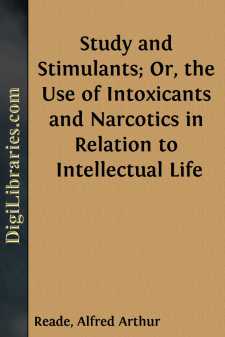Categories
- Antiques & Collectibles 13
- Architecture 36
- Art 48
- Bibles 22
- Biography & Autobiography 813
- Body, Mind & Spirit 142
- Business & Economics 28
- Children's Books 17
- Children's Fiction 14
- Computers 4
- Cooking 94
- Crafts & Hobbies 4
- Drama 346
- Education 46
- Family & Relationships 57
- Fiction 11829
- Games 19
- Gardening 17
- Health & Fitness 34
- History 1377
- House & Home 1
- Humor 147
- Juvenile Fiction 1873
- Juvenile Nonfiction 202
- Language Arts & Disciplines 88
- Law 16
- Literary Collections 686
- Literary Criticism 179
- Mathematics 13
- Medical 41
- Music 40
- Nature 179
- Non-Classifiable 1768
- Performing Arts 7
- Periodicals 1453
- Philosophy 64
- Photography 2
- Poetry 896
- Political Science 203
- Psychology 42
- Reference 154
- Religion 513
- Science 126
- Self-Help 84
- Social Science 81
- Sports & Recreation 34
- Study Aids 3
- Technology & Engineering 59
- Transportation 23
- Travel 463
- True Crime 29
Study and Stimulants; Or, the Use of Intoxicants and Narcotics in Relation to Intellectual Life
Categories:
Description:
Excerpt
I have no experience whatever respecting tobacco: my general opinion is adverse to its use by a healthy man; but that opinion is not founded on any personal experience, nor on any scientific knowledge, as to give it any value for others. My opinion respecting alcohol is that it is a valuable and necessary ingredient in forming and preserving some articles of diet—yeast bread, for example, which can only be produced by fermentation—and that its value in the lighter wines, those in which it is found in, a ratio of from 5 to 10 per cent., is of the same character. It preserves for use other elements in the juice of the grape. As a stimulant, alcohol is, in my opinion, at once a deadly poison and a valuable medicine, to be ranked with belladonna, arsenic, prussic acid, and other toxical agents, which can never be safely dispensed with by the medical faculty, nor safely used by laymen as a stimulant, except under medical advice. As to my experience, it is very limited; and, in my judgment, it is quite unsafe in this matter to make one man's experience another man's guide: too much depends upon temperamental and constitutional peculiarities, and upon special conditions of climate and the like.
1. I have no experience respecting distilled spirits; I regard them as highly dangerous, and have never used them except under medical advice, and then only in rare and serious cases of illness. 2. Beers and the lighter wines, if taken before mental work, always—in my experience—impair the working powers. They do not facilitate, but impede brain action. 3. After an exceptionally hard day's work, when the nervous power is exhausted, and the stomach is not able to digest and assimilate the food which the system needs, a glass of light wine, taken with the dinner, is a better aid to digestion than any other medicine that I know. To serve this purpose, its use—in my opinion— should be exceptional, not habitual: it is a medicine, not a beverage. 4. After nervous excitement in the evening, especially public speaking, a glass of light beer serves a useful purpose as a sedative, and ensures at times a good sleep, when without it the night would be one of imperfect sleep.
I must repeat that my experience is very limited; that in my judgment the cases which justify a man in so overtaxing his system that he requires a medicine to enable him to digest his dinner or enjoy his sleep must be rare; and that my own use of either wine or beer is very exceptional. Though I am not in strictness of speech a total abstinence man, I am ordinarily a water drinker.
LYMAN ABBOT.
March 11, 1882.
MR. S. AUSTIN ALLIBONE, NEW YORK.
I have no doubt that the use of alcohol as a rule is very injurious to all persons—authors included. In about 17 years (1853-1870), in which I was engaged on the "Dictionary of English Literature and Authors," I never took it but for medicine, and very seldom. Moderate smoking after meals I think useful to those who use their brains much; and this seems to have been the opinion of the majority of the physicians who took part in the controversy in the Lancet about ten or twelve years since. An energetic non-smoker is in haste to rush to his work soon after dinner. A smoker is willing to rest (it should be for an hour), because he can enjoy his cigar, and his conscience is satisfied, which is a great thing for digestion; the brain is soothed also.
S. AUSTIN ALLIBONE.
March 27, 1882.
In answer to your question, I can only say that during by far the greatest part of my life I never took alcohol in any form; and that only in recent years I have taken a small fixed quantity under medical advice, as a preventive of gout. Tobacco I have never touched.
ARGYLL.
October 2, 1882.
MR. MATTHEW ARNOLD.
In reply to your enquiry, I have to inform you that I have never smoked, and have always drunk wine, chiefly claret. As to the use of wine, I can only speak for myself. Of course, there is the danger of excess; but a healthy nature and the power of self-control being presupposed, one can hardly do better, I should think, than "follow nature" as to what one drinks, and its times and quantity. As a general rule, I drink water in the middle of the day; and a glass or two of sherry, and some light claret, mixed with water, at a late dinner; and this seems to suit me very well....


